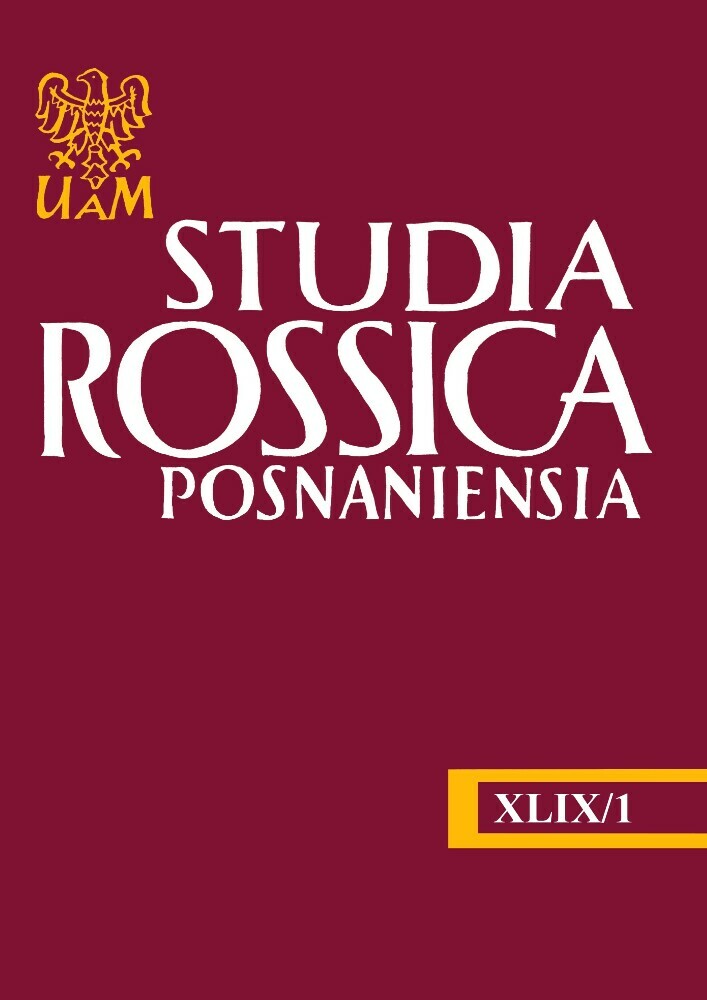Abstrakt
This article is focused on the so-called urban texts related to Poland with a special emphasis on the historical and geographical region of Galicia, which covers the territories of Red Ruthenia in Ukraine and Lesser Poland, and on their historical connotations as presented in Boris Khersonsky’s book of poetry Family archive (2006). Khersonsky is a Russian-speaking Ukrainian poet from Odesa, who has been awarded prestigious prizes for his literary work both in Ukraine and abroad. Family archive can be described as a sort of novel in verse about the tragic history of the 20th century told through the family history of the author himself. The main goal of this article is to analyze the specific spatial structure of the book in the context of geopoetics and places of memory with a special accent on Polish cities and towns. This territory is the quintessential locus of historical events connected to Eastern European Jewish heritage and the tragedy of the Holocaust. This paper seeks to reconstruct the image of Poland with all the connotations and cultural myths associated with its multicultural experience.
Bibliografia
Abdullaev, Evgenij. “Paradoks Hersonskogo, ili «Narisovatʹ čelovečka». Boris Hersonskij”. Voprosy literatury, 6, 2010. Web. 04.05.2023. https://voplit.ru/article/paradoks-hersonskogo-ili-narisovat-chelovechka-boris-hersonskij/.
Abdullaev, Evgenij. “Volâ k pamâti”. Družba Narodov, 2, 2008. Web. 04.05.2023. https://magazines.gorky.media/druzhba/2008/2/volya-k-pamyati.html.
Boym, Svetlana. The future of nostalgia. New York, Basic Books, 2001.
Brio, Valentina. Poèziâ i poètika goroda. Wilno– ענליוו –Vilnius. Moskva, Novoe literaturnoe obozrenie, 2008.
Galina, Mariâ. “Utverždenie prošlogo”. Znamâ, 11, 2007. Web. 04.05.2023. http://www.litkarta.ru/dossier/galina-khersonsky/dossier_1497/.
Gubajlovskij, Vladimir. “Knižnaâ polka Vladimira Gubajlovskogo”. Novyj mir, 7, 2008. Web. 04.05.2023. https://magazines.gorky.media/novyi_mi/2008/7/knizhnaya-polka-vladimira-gubajlovskogo-4.html.
Gubajlovskij, Vladimir. “Svet otsutstviâ”. Novyj Mir, 12, 2007. Web. 04.05.2023. http://www.litkarta.ru/dossier/gubayl-kherson/dossier_1497/.
Hahn, Hannah. They left it all behind: Trauma, loss, and memory among Eastern European Jewish immigrants and their children. Lanham, Rowman & Littlefield, 2020.
Hersonskij, Boris. Semejnyj archiv. Moskva, Novoe literaturnoe obozrenie, 2006. Web. 04.05.2023. http://www.vavilon.ru/texts/khersonsky1-1.html.
Hołub, Beata. “Studium historyczno-geograficzne narodowości w Galicji Wschodniej w świetle spisów ludności w latach 1890–1910”. Annales Universitatis Mariae Curie-Sklodowska, 2, 2013, pp. 15–40.
Khersonsky, Boris. Family archive. Transl. Ruth Kreuzer, Dale Hobson, 1996. Web. 04.05.2023. https://www.dalehobson.org/khersonsky/archive.html.
Kostûkov, Leonid. “S soboj i bez sebâ”. Arion, 4, 2006. Web. 04.05.2023. https://magazines.gorky.media/arion/2006/4/s-soboj-i-bez-sebya.html.
Kostûkov, Leonid. “Sûžet v poèzii”. Arion, 1, 2013. Web. 04.05.2023. https://magazines.gorky.media/arion/2013/1/syuzhet-v-poezii.html.
Krupoves, Valentina. “Dwugłos o Wilnie. Miasto Miłosza i Venclovy”. Konteksty. Polska Sztuka Ludowa, 2/67, 2013, pp. 53–59.
Krupoves, Valentina. “Wędrówki i przechadzki po Wilnie dwudziestolecia międzywojennego”. Przegląd Humanistyczny, 6/58, 2014, pp. 125–137.
Livshin, Olga. From the translator. Web. 04.05.2023. https://www.wordsforwar.com/boris-khersonsky-bio.
Mendilow, Adam A. Time and the novel. Amherst, Humanities Press, 1972.
Nye, David E. “Family as place: Family photograph albums and the domestication of public and private space”. Picturing place. Photography and the geographical imagination. Eds. Joan Schwartz, James Ryan. Milton Perk, Routledge, 2003, pp. 74–95.
Lugarić Vukas, Danijela. “Opʹânenie sovetskim prošlym v sovremennom russkom romane: ot restavracii do refleksii, ot totalʹnosti do ruin”. Slavističeskij sbornik, 103, 2023, pp. 215–229.
Lynch, Kevin. The image of the city. Cambridge–London, MIT Press, 1990.
Melzer, Emanuel. “Emigration versus emigrationism: Zionism in Poland and the territorialist projects of the Polish authorities, 1936–1939”. Contested memories: Poles and Jews during the Holocaust and its aftermath. Ed. Joshua D. Zimmerman. New Brunswick, Rutgers University Press, 2003, pp. 19–31.
Ricoeur, Paul. Time and narrative. Vol. 2. Chicago–London, The University of Chicago Press, 1984.
Rodnânskaâ, Irina. „Nikakoe lekarstvo ne otmenâet bolezni”. Arion, 4, 2007. Web. 04.05.2023. https://magazines.gorky.media/arion/2007/4/nikakoe-lekarstvo-ne-otmenyaet-bolezni.html.
Salomatin, Aleksej. “Èffekt prisutstviâ, ili Politika vmesto poètiki”. Arion, 4, 2010. Web. 04.05.2023. https://magazines.gorky.media/arion/2010/4/effekt-prisutstviya-ili-politika-vmesto-poetiki.html.
Sandler, Stefani. “Poèty i poèziâ v diaspore: o «marginalʹnom evrejstve»”. NLO, 3, 2014. Web. 04.05.2023. https://magazines.gorky.media/nlo/2014/3/poety-i-poeziya-v-diaspore-o-marginalnom-evrejstve.html.
Stier, Oren Baruch. Committed to memory: Cultural mediations of the Holocaust. Boston, University of Massachusetts Press, 2009.
Sztompka, Piotr. “The Trauma of social change. A case of postcommunist societies”. Cultural trauma and collective identity. Eds. Alexander Jeffrey et al. Berkeley–London, University of California Press, 2004, pp. 155–195. DOI: https://doi.org/10.1525/california/9780520235946.003.0005
Štypelʹ, Arkadij. “Roman v stihah ili povestʹ v pisʹmah”. Boris Hersonskij, Semejnyj arhiv. Moskva, Novoe literaturnoe obozrenie, 2006. Web. 04.05.2023. https://magazines.gorky.media/nlo/2004/6/recz-na-kn-pokrovskij-a-kot-spb-2002-pokrovskij-a-begemot-spb-2004-pokrovskij-a-lyudi-lodki-more-spb-2004-hersonskij-boris-semejnyj-arhiv-stihotvoreniya-Odesa-2003-gornung-lev-upavsh.html.
Tyner, James A. Genocide and the geographical imagination of life and death in Germany, China, and Cambodia might be of use to the author. Lanham, Rowman & Littlefield, 2012. DOI: https://doi.org/10.5771/9781442209008
Vorontsova, Kristina. “My svâzany, polâki, davno odnoj sudʹboû…”: Polʹskij tekst russkoj kulʹtury v poèzii vtoroj poloviny XX veka (1945–1991 gg.). Siedlce, Wydawnictwo Naukowe UPH w Siedlcach, 2020.
Vorontsova, Kristina. “Poland as a great borderland in the post-Soviet world: Poetical point of view”. Colloquia Humanistica, 8, 2019, pp. 139–150. DOI: https://doi.org/10.11649/ch.2019.009
Woroncowa, Kristina. “Wizja kultury europejskiej w wierszu Jeleny Szwarc Pływanie”. Źródła Humanistyki Europejskiej, 8, 2015, pp. 91–101.
Licencja
Prawa autorskie (c) 2024 Kristina Vorontsova

Utwór dostępny jest na licencji Creative Commons Uznanie autorstwa – Użycie niekomercyjne – Na tych samych warunkach 4.0 Międzynarodowe.

